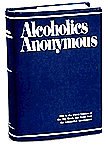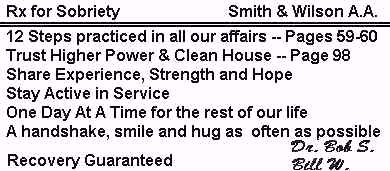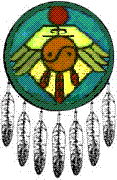

 Click The Images To Go To Page Indicated In The Flag ALCOHOLISM -- Is there a cure? By Stewart Robertson
"NO," SAYS ALCOHOLICS ANONYMOUS, "THERE IS NOT" - BUT THIS VOLUNTARY, NONPROFIT, NO-DUES GROUP OF EX-ALCOHOLICS HAS PUT AND KEPT THOUSANDS ON THE WATER WAGON Every year at this time the alcoholic resolves to quit drinking. The best resolve he could make this year would be to join Alcoholics Anonymous. Having all been alcoholics themselves, these men and women are the best possible ones to help anyone who wants to control his drinking but can't do it alone. They will send information to anyone free of charge. Address Alcoholics Anonymous, Box 459, Grand Central Annex, New York 17, New York Alcoholism is not a "failing" - it is a dread disease. The person branded an alcoholic is at grips with a killer as deadly as cancer or coronary thrombosis. He is not just a social menace; he is desperately ill. The alcoholic can be turned into a sane and sober citizen, and often the best one to show him the way to reformation is not a relative, doctor, or clergyman - it is an ex-alcoholic! In case you don't agree with any of these statements, perhaps you had better read them over again before going on to learn of Alcoholics Anonymous, the organization that knows how to lick the problem facing the drunkard. For the statements are true, if we are to believe the medical profession and the more than 12,000 members of Alcoholics Anonymous who are once more leading decent, self-respecting, useful lives in more than 365 cities. In fact, there is no sensible argument against them. Salvation, conversion, reclamation - call it whatever you like, the AA system gets results. There are no potions to be slipped into one's coffee, no electric shocks, no preaching, and likewise no bullying. It is a new departure, but its fundamentals are as old as man. It is beautifully simple, yet it has something of an eternal mystery. It works. Alcoholics Anonymous got its start when a New York broker known as Bill met an Akron, Ohio physician we shall call Doc. The New Yorker's drinking habits had severely handicapped his career, but he had been firmly aboard the water wagon for five months when he visited Akron in an attempt to swing a deal that would put him back on his financial feet. The deal fell through and the frustrated Bill, alone and unhappy in a strange city, felt the need of a bracer. In other words, a stiff drink of liquor. But knowing that the first drink would only be the cornerstone of a prolonged debauch, Bill fought down the temptation. Back in New York he had found that his greatest help in keeping sober was to talk to other alcoholics under treatment in the hospital where he had been "de-fogged" during his last hangover. He felt that if he could give similar assistance in Akron, he would be safe. So, selecting the name of a clergyman from a church directory in the hotel lobby, he telephoned to ask whether the minister knew of an alcoholic who wanted help. The minister sent him to Doc, a confirmed alcoholic now shaken and remorseful after a terrific bender. Bill worked earnestly on his new friend and won him over to his method of rehabilitation. Then Bill went to live at doc's home, and both men began to wrestle with other alcoholics. They had some success, some failure. The upshot was that Doc, aided by a faithful and heroic wife, turned his home into a small asylum for alcoholics who wanted to be straightened out but had lost the will power to do it themselves. Bill went back to New York, and as he was also married to a brave and patient woman, he was able to do the same thing with his house. In four years Bill and Doc between them guided about 100 alcoholics to dry ground, and soon afterward the subjects told the world about their recovery program and personal histories in a book called "Alcoholics Anonymous," a title that was passed on to the movement which, up to then, had not been christened. Today, five years later, the book has gone through five successively enlarged editions and is greatly responsible for the growth of membership both here and in Canada. The AA program has 12 steps that may be summarized as follows:
As you can imagine, this is simple in outline but not easy to fullfill without a struggle, for the alcoholic is a person of many illusions. One is that someday he will have the whip hand over his drinking - not stop it, mind you - but he will ration himself strictly and imbibe like a gentleman. Another is that by swearing off for a stated period he will be more self-controlled when he starts drinking again. Still another excuse is that he can drink only beer and thus stay away from hard liquor. None of these fallacies impress the particular AA's who have undertaken to help an alcoholic stop drinking, and they tell him so, giving their own experience as a basis. "WE know how it is, say the Aas, and the alcoholic grows interested in these men who understand his problem. The alcoholic is nearly always callous to the pleas of family, friends, and minister because such appeals are voiced too emotionally, although he may have maudlin spells of vowing to reform. But he can be won over by plain talk from ex-alcoholics. "we know what it's like to wait in agony for a saloon to open," continued the AAs, "to hide liquor in half a dozen places in the house, to wake up in a strange room or even a strange town and wonder how you got there. We know what it means to steal money from your wife's purse, to haggle in pawnshops, to have your wife get herself a job in order to pay the rent. And we, too, have thought of jumping from a high window or blowing out our brains." The alcoholic listens with amazement as his new friends describe some of their old escapades, and he realizes that his own adventures were trifling compared to the purple binges confessed to by the very men who are trying to help him. He is told that because he is allergic to alcohol he is poisoned by it, and that the way to stop drinking is to cut it off entirely - because once an alcoholic, always an alcoholic. The AAs know that their man's knowledge of his condition is never enough to make him stop drinking for good. "We know that you lack the proper means of defense against your enemy," they tell him, "so your help must come from a higher power. Why not try God? Here is the stumbling block that appalls many an alcoholic, for, as the secretary of the Alcoholic Foundation explained to me, more than 50% of their members professed to be agnostics, atheists, or backsliders from some church. "I don't believe there is a God," runs the familiar plaint, " or why would he let me get into such a mess?" The AAs are not affronted when they hear this; in fact, they expect it, because they are aware of two things. First, most alcoholics possess a defiant individuality, and second, they resent the idea of God because they themselves cherish a feeling of omnipotence. Therefore, the AAs do not laugh when some weak, drink-ridden soul protests that he is too sane and honest to believe all that old-fashioned stuff about God. They counter by asking whether the alcoholic doesn't believe there is a greater power in the universe than himself. "Why of course," the patient says in substance. "I don't know what it is, but I believe there is some sort of great plan that directs the universe." "All right then," say the AAs, "why not use your own conception of God?" To most of the alcoholics this seems to be an exceedingly brilliant proposal, and men who rebel at the word "God" put their faith in a Creative Intelligence, Supreme Being, Universal Mind, or Spirit of Nature. For some men and women God is the ocean and the stars, in a symphony or picture, on the mountains or in a book. And some believe they have found their conception of God in Alcoholics Anonymous. With no religious ax to grind, any conception that will bring results is all right with the AAs. Remember ...
In some cases the new man ducks the idea of God or a substitute and tries to right himself by being honest, tolerant, and helpful toward other alcoholics. An AA member asked me to report that it is their experience everywhere that faith always comes to those who try this simple approach with an open mind - and in the meantime they stay sober. But those who actively deny the spiritual content in the program seldom remain dry. AA stresses the spiritual because thousands of its members have found they cannot succeed without it. The achievement of a fresh understanding with friends, creditors, and even enemies is as severe a wrench to the alcoholic's pride as it would be to the rest of us. Yet the fact remains that when the patient goes through with this part of the program he feels like a new man. It may involve reconciliation with wife and children, often a slow process not gained by promises but by performance over a long pull. This is a matter for the alcoholic to struggle with alone, but when it comes to more prosaic adjustments with creditors, there have been cases where AAs gambled on their choice by advancing him the money to settle his debts. There was never an alcoholic who didn't manage to get his social and business relationships into hopeless confusion, and AAs claim the disentangling process can only be made possible and bearable through faith. When the alcoholic is in the clear, confident and happy in his new strength, he is reminded that faith without works is dead. This mental nudge is scarcely needed, for the now ex-alcoholic is eager to do missionary work among those still trapped by the allure of liquor. He realizes that alcoholism has brought more sorrow to the human race than any other agency, for its destruction is neither merciful nor swift. He understands that liquor breaks down not only the physical man, but so relentlessly sabotages the will that a self-starting cure is almost impossible. He knows that no amount of adversity will permanently divert the alcoholic to sobriety. He understands that the patient will have to fight not only himself but many of his drinking companions whose tender hearts will impel them to smuggle a flask to their battling comrade. He stands ready to answer the call of an alcoholic at any time, even at three o'clock in the morning, and often does just that. And being a recovered alcoholic, he will be free from the misguided passion of the nondrinker who tries to thrust abstinence on a sinner. You can understand why this sort of co-operation has caused Alcoholics Anonymous to become known to more than 12,000 people in urgent need of rescue. Do they never fail? Being human, yes, they do. AA estimates that 50% of the patients stop drinking almost at once, many after reading "alcoholics Anonymous" and without requiring further aid; 25% win through after one or two relapses; the other 25% are frankly doubtful cases. Never do the AAs regard themselves as "cured" but they do become total abstainers from liquor. Some of them may shudder at being "saved," but that is, of course, what really happens. And with an estimated 300,000 alcoholics in the country, there is plenty of saving yet to be done. The term "alcoholic" does not apply to the millions of moderate drinkers or even to those who go on occasional benders; it relates only to the problem drinkers who are men overboard and about to go under. Alcoholics Anonymous and its Foundation take no stand on the liquor question. They are neither wet nor dry, but their purpose for existence leaves no doubt. If you know of an alcoholic who might be helped by their recovery program, AA will tell you if there is a member in your town and where he can be reached. If an eligible person wants to start a chapter, AA will tell him how to go about establishing it, but after that the unit will be on its own. There are no dues, fees, or assessments in Alcoholics Anonymous, and the chief requisite for membership is an earnest desire to stop drinking. And should you want a copy of "Alcoholics Anonymous" which is packed with clearly worded helpfulness buttressed by dramatic case histories, either to give to a friend in despair or to read yourself for its impact as a human document, AA will send it to you direct for $3.50. For an answer to any question you may have about AA, write a letter to Alcoholics Anonymous, Box 459, Grand Central Annex, New York 17, New York. In case you order the book, make your check or money order payable to Works Publishing, Inc., at the same address. Literature is sent free with answers to all inquiries. Alcoholics Anonymous is not an aggregation of saints. Its members are people who have regained their footing in a precarious world hitherto unable to help them, and they have learned how to live happily, usefully, and without fear. No AA need ever be lonesome, for the members are friends held together by an unusual bond, and being largely gregarious, they lunch, play cards, bowl, swim, and talk in groups. Members of many units have chipped in to provide a clubroom. And don't get the idea that they become hermits who shun the sight of liquor. It isn't uncommon for AAs to stand at a bar and drink ginger ale; they would no more order a whisky and soda than you would call for a glass of carbolic acid. The comeback road is a tough one, and as in any other trial, the old saying holds true, "Only the game fish swim upstream." Perhaps you'd like to pass on this message from one of the two founders of Alcoholics Anonymous: "If you think you are an atheist, an agnostic, a skeptic, or have any other form of intellectual pride that keeps you from accepting what AA has to offer, I feel sorry for you. If you still feel you are strong enough to beat the game alone, that is your affair. But if you really want to quit drinking liquor for good and all, and sincerely feel that you must have some help, we know that we have an answer for you. It never fails if you go about it with one half the zeal you have been in the habit of showing when getting another drink." Source: The Family Circle, January 5, 1945 Index of AA History Pages on Barefoot's Domain As in so many things, especially with we alcoholics, our History is our Greatest Asset!.. We each arrived at the doors of AA with an intensive and lengthy "History of Things That Do Not Work" .. Today, In AA and In Recovery, Our History has added an intensive and lengthy "History of Things That DO Work!!" and We will not regret the past nor wish to shut the door on it!!
KEEP COMING BACK!
On the Web August 27, 2001 in the Spirit of Cooperation Three mighty important things, Pardn'r, LOVE And PEACE and SOBRIETY |

